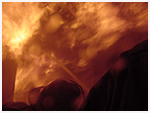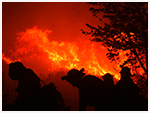« LBFD Visits Long Beach Memorial Miller Children’s Hospital | Home | LBFD’s Annual “Spark of Love” Code 3 Toy Drive »
It’s The Law – Carbon Monoxide Detectors
By jiarviz | December 21, 2012
The Long Beach Fire Department would like to remind the community about the Carbon Monoxide Poisoning Prevention Act (Senate Bill – SB 183). SB-183 requires that a carbon monoxide (CO) device be installed in all dwelling units intended for human occupancy. The effective date for Multi-family dwelling units such as apartments, having fossil fuel burning appliances and/or attached garages, is January 1, 2013. On July 1, 2011 SB-183 went into effect for a single-family dwelling having fossil fuel burning appliances and/or attached garages. It will go into effect for hotels and motels having fossil fuel burning appliances and/or attached garages on January 1, 2016.
CO is a colorless, odorless gas that is produced from heaters, fireplaces, furnaces, and many types of appliances and cooking devices. The only way to detect the poisonous and potentially fatal gas is with a detector. According to the State Fire Marshal’s Office CO claims the lives of an average of 480 people, and sends more than 20,000 people to emergency rooms across the nation. The best way for homeowners to stay protected from carbon monoxide is to have a CO detector installed on every floor and outside each sleeping area. The California Office of the State Fire Marshal cited a recent study that found nearly nine in 10 California households do NOT have a CO detector. Many consumers are likely unaware of the need to have their homes equipped, and many may need to remind their landlords to act.
Owners or landlords of multi-family leased or rental dwellings, such as apartment buildings, are required to comply with the law and are responsible for installation, so for tenants whose units do not have a CO detector now is the time to follow up with landlords by requesting one. Failure to equip a property with CO detectors puts families in danger, and is a violation of State law that is punishable by a maximum fine of $200 for each offense. CO detectors do not take the place of smoke detectors; you must have both to fully protect occupants. If you already have both a CO detectors and smoke detectors in your home it’s a good time of year to replace the batteries.
Here are some guidelines to help protect against CO poisoning:
- Install a CO detector near each sleeping area and on every level of the home, including the basement. Ensure that the alarms are plugged in the outlet or, if battery operated, have working batteries installed. Make certain each person can hear the CO alarm sounds from his or her sleeping room.
- Have fuel burning heating equipment and chimneys inspected by a qualified professional every year before cold weather arrives. During the heating season, clear filters and filtering systems of dust and dirt.
- Be sure to open the flue for adequate ventilation when using a fireplace.
- Inspect the pilot lights on natural gas appliances to ensure that the flame is blue. When a flame is mostly yellow in color, it likely is producing CO.
- Clean out the lint and debris that may build up in the clothes dryer vent which leads to the outside of the house.
- Ensure that all space heaters are free of dust and are vented properly. Likewise, only use generators in a well-ventilated location outdoors away from windows, doors, and vent openings.
- Use barbeque grills outside ONLY and NEVER indoors or in the garage.
- Never leave an auto running in a garage; even for a couple of minutes and not even if the overhead garage door is open.
For more information regarding SB-183 visit the State of California office of the state Fire Marshall at http://osfm.fire.ca.gov
###
Deprecated: Function link_pages is deprecated since version 2.1.0! Use wp_link_pages() instead. in /home/firechan/public_html/blog/wp-includes/functions.php on line 6121
Topics: Public Safety | 55 Comments »
Comments are closed.


